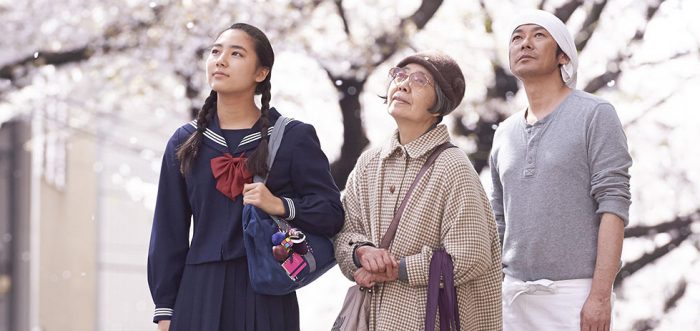
The new film from Naomi Kawase, An, is so anodyne it essentially stars a sweet red bean paste.1 Kawase invests the paste with a character’s qualities, like temperament and stakes in the guileless narrative. “Listen to the stories the beans tell,” the elderly Tokue (Kirin Kiki) urges Sentaro (Masatoshi Nagase) as they stir a pot of it early in the film. He’s a hardened chef, she a culinary artisan teaching him to perfect the paste that fills a small Japanese pancake known as dorayaki. A significant plot point arrives when Sentaro reveals he’s never eaten one of his own dorayaki – that it might fill the hole in his heart! And that bean paste, bubbling and whispering stories in the background, is as saccharine as the film itself.
The film opens in a part of Japan filled with the pastel pink cherry blossoms its director is so fond of shooting. The septuagenarian Tokue moves with wanderlust through the din of metropolitan traffic. Scenes then show the rigour and precision with which Sentaro cracks eggs, measures sugar, and dollops the dorayaki pancake onto a hot plate, but Tokue is aghast to find the red filling isn’t home-made when she later drops by. Sentaro has work going, but initially believes Tokue too old, her hands too arthritic, to fill the position until he tries her own artisan paste. Elsewhere, a woman bluntly shouts, “studying doesn’t put food on the table!” and her scorned daughter pulls up a seat at the chef’s counter. These three socially isolated characters make their way to one another’s lives in a ritual set-up that will see sageness passed down from old to young.
What I’ve described only comes to the pass in the first twenty minutes or so of An, but what rounds out its two perversely gentle hours rarely hews from these standards. People compact their feelings into statements that feel more general than personal, meaning is carried by trite and metaphorical gestures, and schmaltz is tendered by the characters’ dependence on each other. When backstories are raised, tempers aren’t. This film is by nearly every measure minor, to the extent that Kawase favours whimsical nothings over dialogue that might lend its central relationship more texture. There’s no drama to be found between the characters of Tokue or Sentaro, who share the spotlight, but the slow burn of the film’s eventual answer to the question of where Tokue came from.
An opened this year’s ‘Un Certain Regard’ Cannes sidebar, where its tender humanism, needless to say, prompted a number of critics to sharpen their knives and dice its small proportions even further.2 For my money, Kawase’s problem isn’t so much the execution as the selection of her story. Customers repeatedly praise Tokue’s paste and mouths often fall agape while trying it, but little can assuage the impression that the director is telling an essentially culinary and fragrant tale through an audiovisual medium. Kawase has the wit to downplay this by devoting attention to the religious routine with which Sentaro and Tokue cook the an. Can this kind of dedication create taste by transfer? Not really. The sight of braising an is so regular, it’s almost stock footage. And that’s to say nothing of nature, pensive shots of which are used as a fall-back to set and carry between these cooking sessions.
Despite this, An comes out more lilting than outright boring – in part because its formula is thrown off-course by ambiguity. Take Sentaro, who pays Tokue but a pittance for her labour and ignores the obvious signs of her senility. When her tragedy-ridden past is later aired, the film does it in a way that doesn’t harangue Sentaro for the ignorance of his misdeeds. I’m recommending An because of how it’s sustained by these contradictions, be they intentional or otherwise. The people are people, not mascots of good and bad becoming better – even if the line between them is thin.
